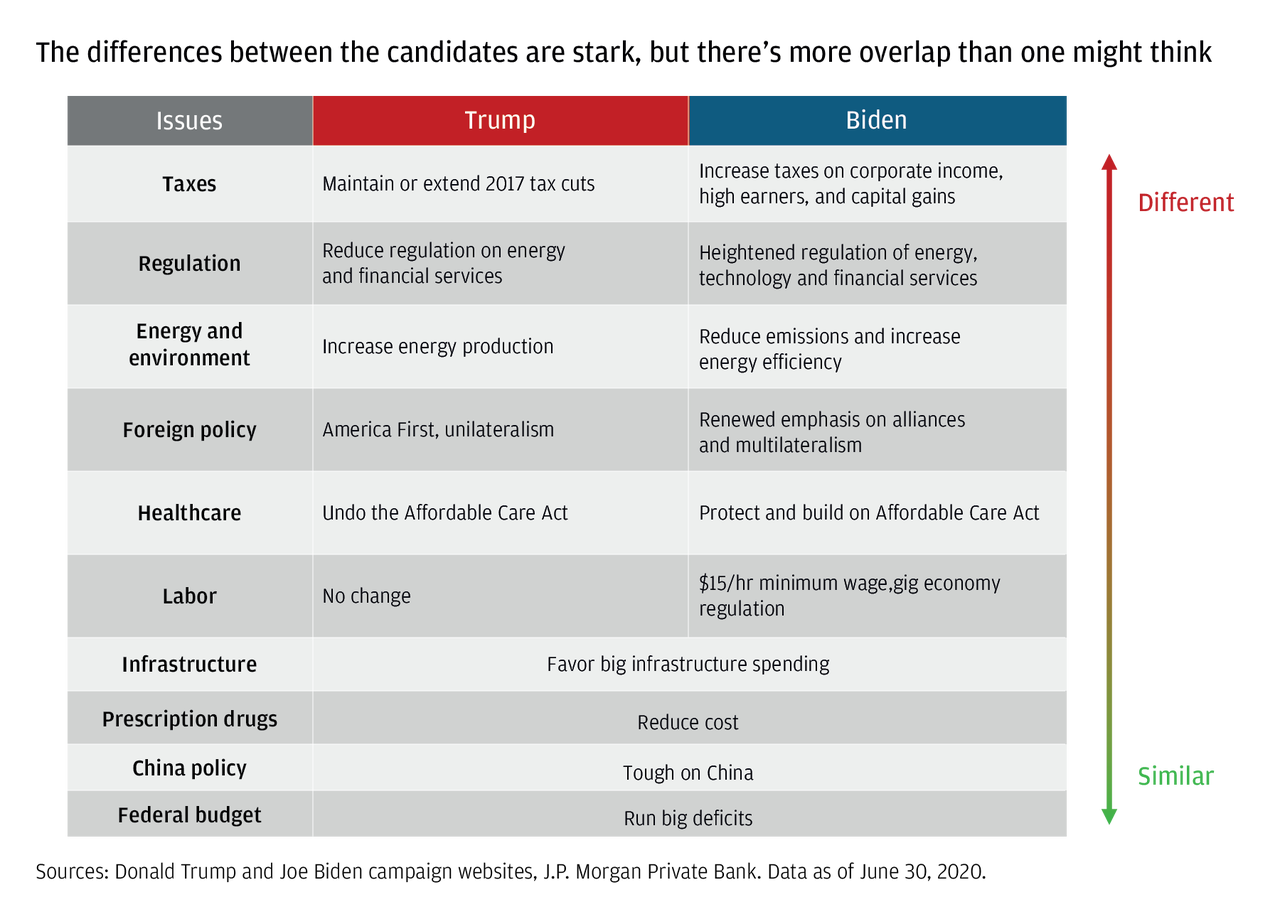
Article written by Tyler Durder, Zerohedge.com
All summer, investors have been hearing incredibly confusing narratives in regards to the November election, and its impact for equity markets.
For example, JP Morgan, who believes that in the case of a Democrat victory, which would likely see an increase in the top long-term capital gains tax from 20% to 39.6% (under the Biden administration), investors should not sell. Regardless of the outcome, you will be ok….
This is despite clear differences in tax regimes between the administrations

JPM says “ignore it all”, and “don’t let the passions of this election lead you to make any key planning or investment decisions.”
However, in a note from Larry McDonald’s Bear Traps report (an investment newsletter), he believes that the race is a lot closer than people think.
“A lot of Republicans that did not vote for Trump in 2016, will support him now. We know polls ignore Trump’s silent support and Nixon-like, law, and order support. In our view, he gets 8 to 9% of the African American vote vs. 6% in 2016 -this is a meaningful needle mover. However, Biden will definitely bring out more voters than Clinton. Biden could win the popular vote by 5 million and still lose the EC, there is that much dispersion between large cities and the country. Trump is loud-mouth with large scale connection to middle-class voters.”
In light of these juxtaposing reports, Goldman has released three key events that will impact the equities market for the next three months, aiming to clarify the situation.
Goldman chief equity strategist, David Kostin, wrote in his weekly Kickstart report, three key events that will impacts the equity market over the next two moths:
- New information on the election
- Vaccine
- Q3 Earnings
Kostin then writes that “the vaccine represents a more important factor than the election result for the recovery in S&P 500 fundamentals.”
This comes off a recently released graphic from Superforcaster, Good Judgement, on the the question of when will enough doses of an FDA-approved vaccine to inoculate 25 million people be distributed in the US.

Despite the expectation that a vaccine will likely not be available until early 2021, Goldman’s Pharmaceutical and Biotechnology equity analysts Terence Flynn and Salveen Richter remained optimistic.
Here are the key takeaways:
- Multiple vaccines are advancing in late-stage development based on encouraging initial data and one panelist estimated the vaccines have a 90%+ probability of success;
- FDA guidance as it relates to requirements for emergency use authorization for vaccines was described as a non-binary “continuum” by MRNA;
- amidst investor debate on timelines, HHS Secretary Azar offered upbeat commentary noting that, contingent on success, 100mn vaccine doses could be available in the US by year-end for vulnerable populations, with widespread availability by March/April 2021;
- the biggest challenge to vaccine uptake will not necessarily be cold-storage and distribution but rather convincing the broader population to get vaccinated (something Zero Hedge first warned about back in August ). Aside from the vaccine, therapeutic antibodies from LLY and REGN have demonstrated a benefit on hospitalizations/ER visits in early studies, offering a potential bridge to broader availability of vaccines, a dynamic potentially underappreciated by investors.
Moving past election and vaccine talk, the final key theme for investors will be Q3 corporates earnings.
Kostin vies Q3 earnings season as follows:
During the quarter, the Goldman Sachs equity analyst US re-opening scale averaged between 4 and 5 on a continuum between 1 (lockdown) and 10 (fully re-opened). The consequences of the semi-frozen economy on an uneven road to recovery will be visible in 3Q results.
Consensus expects 3Q S&P 500 EPS will decline by 21% on a year/year basis, following a 32% drop in 2Q and a 15% fall in 1Q. Including the anticipated 14% fall in 4Q, our full-year 2020 EPS estimate of $130 reflects a 21% year/year decline from the 2019 level. Looking forward, we project a strong 30% earnings rebound to our baseline 2021 EPS forecast of $170, followed by 11% growth to $188 in 2022. In other words, there will be NO EPS GROWTH the end of 2018 and the end of 2021 even as the stock market has risen nearly 40% since then.
Furthermore, Goldman expects three major themes which will characterize Q3 across most sectors:
- First, a collapse in margins, with aggregate index-level margins compressing by 220 bps on a year/year basis to 8.7%. For context, although the margin decline in 3Q will represent a slight improvement from the peak pandemic decline in 2Q (-223 bp to 8.6%), it will still register as the lowest level of margins since 2010.
- Second, the modest 3% decline in aggregate sales will mask the bi-modal story beneath the surface. Cyclical sectors will suffer sharp revenue declines led by Energy (-32%). In Industrials, a 15% fall in sales will lead to a 62% plunge in EPS as the sector suffers from elevated operating leverage. Banks earnings are expected to decline by ~25% as pre-provision net revenues continue to deteriorate, despite smaller expected reserve builds. In contrast, Health Care (+5%), Consumer Staples (+4%), and Info Tech (+3%) are expected to post positive sales growth. Large-cap stocks appear better positioned for 3Q than small-cap stocks. Investors have exhibited a preference for size in 2020 with the S&P 500 climbing by 8% YTD vs. -1% for the Russell 2000. The 5 largest S&P 500 stocks –AAPL, MSFT, AMZN, GOOGL, and FB –are expected to grow 3Q sales and EPS by +13% and +1%, respectively, compared with -5% and -24% for the rest of the S&P 500. The disparity is even more apparent across indices. While S&P 500 EPS is expected to fall by 21%, consensus forecasts earnings for the small-cap Russell 2000 index will fall by 40%.
- Third, most managements will still be reluctant to provide forward earnings guidance. The uncertain timeline of a vaccine that is essential for the normalization of the economy, the stalled talks between the Trump administration and Congress on an interim fiscal package, and the contentious election that is only 25 days away are all valid reasons for executives to minimize forward-looking commentary. However, consensus 2021 EPS estimates have recently troughed and started to turn positive. S&P 500 earnings revision sentiment sits at the 95th percentile
Kostin believes that corporate earnings will hold little merit in determining of the direction for the market.
The global investment research team for Goldman also modeled potential election results and their effect on EPS:
“We recently modeled the earnings impact of various election outcomes. Our analysis focused on the proposed and expected policies related to tax reform, fiscal stimulus, and trade. By 2024, we model just a 4% difference between our baseline EPS forecast ($214), which assumes no change in policy, and the potential earnings outlook under policies expected to be enacted in the event of a Democratic sweep ($222). Our analysis suggests that a large increase in fiscal spending, funded in part by increased tax revenue, would boost economic growth and help offset the earnings headwind from high tax rates.”
In the case of a ‘Blue Wave’, Goldman economists “expect that a Biden administration would prioritize fiscal stimulus in the first year of its administration followed by a phasing-in of tax reform in 2022/23.”
However, for those that tuned in to the VP debate Wednesday, Senator Harris remarked that the Biden administration would raise taxes “day one”.
Goldman’s conclusion, “if the Democrats were to implement both fiscal stimulus and tax reform in 2021, we estimate these polices would have largely offsetting effects, leading to S&P 500 EPS being roughly in line with our status quo 2021E estimate but lower thereafter.”
So… a Bear/Bull hybrid is on the cards it seems? Goldman’s report seems eerily similar to JP Morgan’s, both without a clear good/bad outcome, but a bit of both.
Time will tell of the true outcome. Though, one things for certain, there will always be the Fed to spend the cash.
Works Cited:
https://www.zerohedge.com/markets/goldman-here-are-three-key-things-markets-next-two-months
